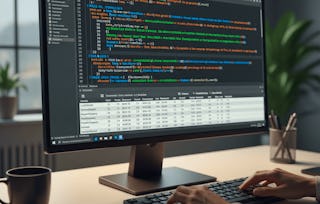This course is for users who want to learn how to write SAS programs to access, explore, prepare, and analyze data. It is the entry point to learning SAS programming for data science, machine learning, and artificial intelligence. It is a prerequisite to many other SAS courses.

Getting Started with SAS Programming

Getting Started with SAS Programming
This course is part of SAS Programmer Professional Certificate

Instructor: Stacey Syphus
Access provided by FutureX
118,209 already enrolled
3,176 reviews
Skills you'll gain
Details to know

Add to your LinkedIn profile
61 assignments
See how employees at top companies are mastering in-demand skills

Build your Data Analysis expertise
- Learn new concepts from industry experts
- Gain a foundational understanding of a subject or tool
- Develop job-relevant skills with hands-on projects
- Earn a shareable career certificate from SAS

There are 8 modules in this course
In this module you learn about the course and you set up the data you need to do the practices in the course.
What's included
3 videos4 readings
In this module you learn how to use SAS programming tools and the fundamentals of SAS program structure and syntax.
What's included
7 videos2 readings3 assignments1 discussion prompt
In this module, you learn to identify the features of a SAS table, access data through SAS libraries, and import data into SAS.
What's included
14 videos1 reading9 assignments2 discussion prompts
In this module, you learn to use SAS procedures that provide insights about your data. You also learn to subset data so you can focus on particular segments, format data so you can easily understand it, and sort data to identify and resolve duplicate values.
What's included
16 videos1 reading13 assignments1 discussion prompt
In this module, you learn how to do some common data manipulations, such as filtering rows and columns, computing new columns, and performing conditional processing.
What's included
13 videos4 readings16 assignments1 discussion prompt
In this module, we concentrate on summarizing data by using the SAS procedures that we touched on for data exploration. You also learn how to use titles, column labels, footnotes, and macro variables to enhance your reports and make them more meaningful.
What's included
11 videos2 readings10 assignments1 discussion prompt
In this module, you learn to export SAS tables and results to Excel, Microsoft Word, and PDF files.
What's included
8 videos3 readings6 assignments1 discussion prompt
In this module, you learn to use the SQL procedure to read and filter data. You also learn to create and join tables by using SQL.
What's included
10 videos1 reading4 assignments2 discussion prompts
Earn a career certificate
Add this credential to your LinkedIn profile, resume, or CV. Share it on social media and in your performance review.
Instructor

Offered by
Why people choose Coursera for their career

Felipe M.

Jennifer J.

Larry W.

Chaitanya A.
Learner reviews
- 5 stars
84.88%
- 4 stars
12.50%
- 3 stars
1.35%
- 2 stars
0.31%
- 1 star
0.94%
Showing 3 of 3176
Reviewed on Mar 29, 2021
Great course and awesome instructor. Learned a lot about some SAS capabilities, syntaxes, and others. Highly recommend this course if you would like to start getting to know SAS programming.
Reviewed on Jul 24, 2022
Hello AllI do recommend this course to all who wants to learn SAS with on prior knowledge of programming. This course will give you solid foundation on SAS basics. Thank you.
Reviewed on Aug 29, 2020
I really felt like I learned a lot. The class was well organized with great examples and activities. I would highly recommend this course. I plan on taking the next series of classes.





